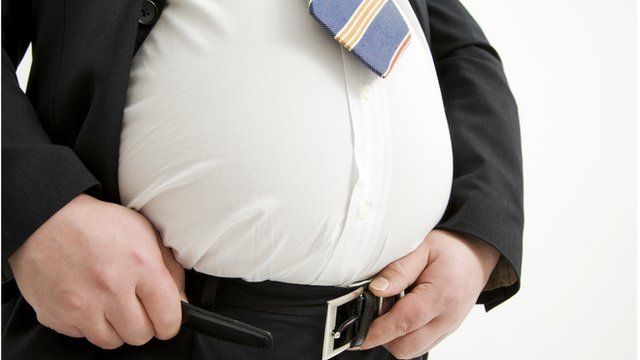Obesity 'could be a disability' - EU courts rule
- Published

Obesity can constitute a disability in certain circumstances, the EU's highest court has ruled.
The European Court of Justice was asked to consider the case of a male childminder in Denmark who says he was sacked for being too fat.
The court said that if obesity could hinder "full and effective participation" at work then it could count as a disability.
The ruling is binding across the EU.
Judges said that obesity in itself was not a disability - but if a person had a long-term impairment because of their obesity, then they would be protected by disability legislation.
The case centres around childminder Karsten Kaltoft who weighs about 160kg (25 stone).
He brought a discrimination case against his employers of 15 years, Billund local authority, after he was sacked four years ago.
The authority said a fall in the number of children meant Mr Kaltoft was no longer required.
But Mr Kaltoft said he was dismissed because he was overweight.
'No problems'
Earlier this year, he told the BBC that reports that he was so fat he was unable to bend down to tie children's shoelaces were untrue.
Describing his work with children, he said: "I can sit on the floor and play with them, I have no problems like that.
"I don't see myself as disabled. It's not OK just to fire a person because they're fat, if they're doing their job properly."
The Danish courts asked the European Court of Justice (ECJ) to clarify whether obesity was a disability.
The ECJ ruled that if the obesity of the worker "hinders the full and effective participation of that person in professional life on an equal basis with other workers", then obesity can fall within the concept of "disability".
Rulings from the European Court of Justice are binding for all EU member nations.
The courts in Denmark will now have to assess Mr Kaltoft's weight to see if his case can be classed as a disability.
Analysis
by Clive Coleman, BBC's legal correspondent
Today's ruling was of great interest to employers across Europe. The judgement makes no direct link between Body Mass Index and obesity, but is a powerful statement that an obese worker whose weight hinders their performance at work is entitled to disability protection.
That will mean employers must, on a case by case basis, make reasonable adjustments such as providing larger chairs or special car parking, and protect such employees from verbal harassment.
But there are wider implications. Providers of goods and services such as shops, cinemas and restaurants will also have to make reasonable adjustments for their customers, which might include things like special seating arrangements.
The key concept here is that adjustments must be "reasonable" - so it may be deemed reasonable for a Premier League football club to make two seats available for someone disabled through obesity, but not for a small, non-league club.
Obesity, particularly what is sometimes known as morbid or severe and complex obesity, can be a particularly sensitive subject.
Employers and service providers will have to take care not to make assumptions about the needs of an obese worker or customer.
'Wider seats'
Jane Deville Almond, the chairwoman of the British Obesity Society, said obesity should not be classed as a disability.
She told the BBC: "I think the downside would be that if employers suddenly have to start ensuring that they've got wider seats, larger tables, more parking spaces for people who are obese, I think then we're just making the situation worse.
"[It is] implying that people have no control over the condition, rather than something that can be greatly improved by changing behaviour."
Paul Callaghan, head of employment law at international law firm Taylor Wessing, said the ruling does not change UK law.
"The European Court of Justice has ruled that obesity itself is not a disability, but that the effects of it can be.
"As such, workers who suffer from, for example, joint problems, depression, or diabetes - specifically because of their size - will be protected by the European Equal Treatment Framework Directive and cannot be dismissed because of their weight."
Employers' responsibility
Audrey Williams, employment law partner at Eversheds, said the mere fact someone is obese is not enough to make them disabled.
"What the court are saying is that obesity is not protected unless it hinders professional life."
She said the ruling would increase awareness among employers of their responsibility towards obese employees in the workplace.
This could include making reasonable adjustments to working arrangements, seating arrangements or making access to the office easier.
However, Tam Fry, from the National Obesity Forum, said the ruling had opened a can of worms for UK employers.
"They will be required to make adjustments to their furniture and doors and whatever is needed for very large people.
"I believe it will also cause friction in the workplace between obese people and other workers."
One in four people in the UK is classified as obese.
- Published12 June 2014
- Published18 June 2014
- Published12 July 2012
- Published13 January 2014